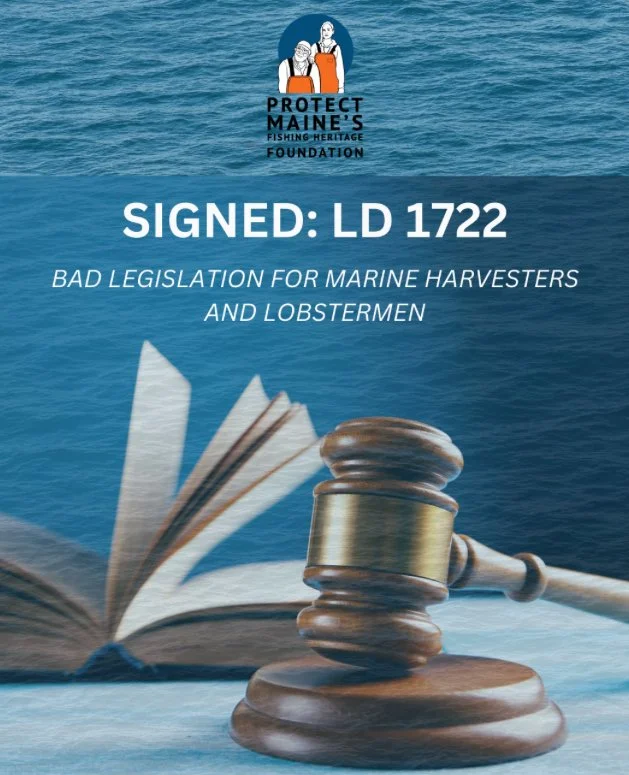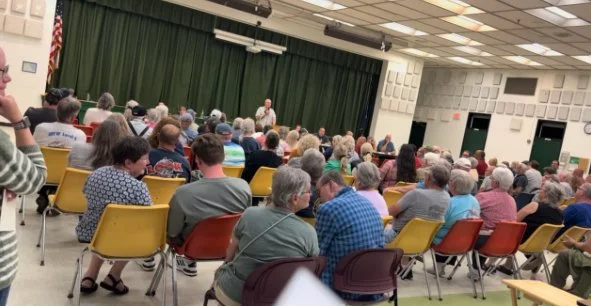Click here to listen to the conversation with Neville Crabbe, ASF’s Vice President of Communications and Special Projects about the future of salmon farming in Atlantic Canada.
Cushing Residents Speak Out on Industrial-Scale Aquaculture
CUSHING — A proposal for the town to acquire the first public access to the waterfront received a mixed reaction Jan. 15 with several residents and out-of-state property owners of Pleasant Point Road voicing concern about the impact from added traffic.
But the harbor master and a longtime town official said they did not expect those would be impactful issues.
This town currently has no municipal-owned public access to the water.
Residents will get to vote on the articles by secret ballot at the polls on March 16. The in-person town meeting will be held at 6 p.m. March 17.
Dead Fish and Statehouse Battles: Fighting Fish Farms in Maine
As Keith Decker assumed the role of CEO of American Aquafarms in 2021, the firm was seeking to build a massive salmon farm off the coast of Acadia National Park. The first order of business was damage control. It wasn’t just the bad press about his predecessor, who had been convicted and jailed on fraud charges in Norway a decade before. There was also growing public resentment toward the project.
It was meant to be the largest salmon farm in the world, with a 30,000-ton pen to grow the fish. The proposal claimed it would produce 66 million pounds of non-GMO salmon each year and make Maine the testing ground for mass-production aquaculture.
The farm would be situated in one of the poorer areas of the state, where job creation is a constant topic of interest. Locally, the company pitched the project as a job creator; more broadly, it said it aimed to curb the U.S.’s dependence on imported seafood.
More Maine towns assert authority over aquaculture, but is it legal or sustainable?
Beals is a visually stunning place, an archipelago ripe with the kind of Instagram-ready seaside and working waterfront scenes that draw summer-long crowds to southern Maine destinations. But dangling like a pendant from the Downeast coast, it’s far closer by distance and tradition to maritime Canada than Portland.
Driving south over the crest of the Beals Island Bridge reveals much about the community ahead. Modest homes dot Beals’ gently sloping uplands. Fishing piers and wharves jut from the shoreline. Commercial lobster boats and the odd bottom-dragger crowd the mooring fields. During the summer months, pleasure craft powered by either motor or sail are conspicuously absent.
For some towns like Beals, whose economies revolve around heritage fisheries, the growing number of aquaculture leases along Maine’s coast warrants a degree of vigilance and even action. Thirty-three leases were approved in 2025, a 27% increase over the previous five-year average of 24. Since 2022, eight Maine towns have responded by asserting varying degrees of home rule over aquaculture development.
Nylon aquaculture nets found to release five times more microplastics than other materials
Norwegian research organization SINTEF has released a report finding that nylon aquaculture nets release five times more microplastics than nets made from other materials.
The release of most microplastics into the marine environment is commonly believed to come from land-based sources, but according to SINTEF, fisheries and aquaculture farms are becoming increasingly reliant on plastic equipment and infrastructure, introducing microplastics directly into ocean waters and contributing both to environmental and seafood contamination.
“I’m not sure the aquaculture industry, or anyone else for that matter, really had any idea about their relative contribution to microplastic emissions,” SINTEF Ocean Chief Scientist Andy Booth, who was the report’s lead author, said.
Towns across Maine say No to industrial scale aquaculture.
(Portland, Maine) You can add the town of Cushing to a growing list of communities that are putting local limits on large scale aquaculture. On November 4th, the voters of Cushing approved a moratorium on industrial-scale aquaculture by a wide margin of 467 to 193. Cushing is the latest community to adopt a moratorium on industrial scale aquaculture in its coastal waters and now will build its own permanent ordinance to protect Maine waters against the damaging community impacts of such operations.
Overwhelming Vote in Cushing
This post originally appeared in The Midcoast Villager. Written by Stephen Betts.
Residents in Cushing overwhelmingly voted to enact a 180-day moratorium on industrial-scale aquaculture projects. The Select Board placed that question on the Nov. 4 municipal ballot.
The moratorium on industrial-scale aquaculture projects was approved 467 to 193. The moratorium will allow the Planning Board to come up with recommended regulations that would then have to go to voters.
Report finds aquaculture feed utilizing fish from West African fisheries could impact local food supplies
An investigation by DeSmog through a partnership with investigative journalism platform Follow The Money has reemphasized that the use of pelagic fish from West African fish in aquaculture feed results in lower supplies of food for local residents.
The multi-part industrial aquaculture series by DeSmog has found fish farmed in multiple countries rely on feed that, in some cases, uses fishmeal sourced from West African fisheries with questionable sustainability. The latest report by the news outlet found Dutch supermarkets, for example, sell sea bass which are fed with feed containing ingredients from Senegal’s sardine fishery.
Aquaculture Lease Renewals in Downeast Maine
We have a great deal of information for you today in case you want to submit comments regarding the renewal of the six Cooke Aquaculture lease sites in Downeast Maine. Here is the link to the chart below. https://www.maine.gov/dmr/aquaculture/maine-aquaculture-leases-and-lpas/pending-lease-applications
Once you open the link, you will have to scroll to the bottom to the renewals section. If you open the App (application) link it will show you details about the location.
Law Change
LD 1722 was approved in the legislature and signed by the Governor. Lease renewals are no longer adjudicatory, so there is no longer an option to request a public hearing.
However, there is still a 30-day written comment period, which is the opportunity to submit feedback on the renewal request as it relates to applicable criteria.
Anyone who wants to comment must submit written comments that address criteria for renewal only.
Criteria as listed on the DMR website:
Before the lease expires, the holder may submit a renewal application to DMR requesting that the term be extended for up to 20 years. Standard leases may be renewed if they meet the conditions established in 12 M.R.S.A. §6072(12) and Chapter 2.45:
The lessee has complied with the lease agreement during the term of the lease;
The commissioner determines that renewal of the lease is in the best interest of the State;
The renewal will not cause the lessee to become a tenant of any kind in leases covering an aggregate of more than 1,000 acres; and
The lease is not being held for speculative purposes.
The State must notice riparian landowners within 1,000 feet of the lease site.
Address Comments to DMR Commissioner Carl Wilson and if you have concerns, explain why these leases should not be renewed using the criteria listed above.
Deadlines: The deadline for comments to be submitted is Sept. 28, 2025, at 4:00 pm.
Submit to: DMRaquaculture@maine.gov
DMR Commissioner Carl Wilson will be the final decision maker on whether the state renews the leases.
If you have questions, please feel free to reach out to Protectmaine@gmail.com
Good News in Lubec!
We are pleased to share some very big news! On August 6, 2025, Lubec residents enacted an ordinance that addresses industrial scale aquaculture in their waters. This is a significant victory for the people who love to fish, lobster, and recreate on the water.
The vote was 94-81. This brings the total number of towns that have enacted aquaculture ordinances or moratoriums to eight (Penobscot, Winter Harbor, Harpswell, Cutler, Waldoboro, Gouldsboro, Beals, Lubec) and we are working with towns all up and down the coast that want a say in their future. Each town has either used our ordinance in full, adapted it or chosen to develop their own completely. We applaud each town for doing what is best on their body of water.
While Lubec citizens made their voices heard, the governor chose this session to limit citizen input on aquaculture lease renewals. LD 1722 is a disastrous piece of legislation introduced by a member of the Marine Resources Committee who is also an aquaculturist.
This could directly impact the lives of lobsterman and women and communities in Downeast Maine several hundred miles away from southern Maine and Augusta. It eliminates public hearings on lease renewals. A nod goes to DMR for testifying against the bill as did Protect Maine’s Fishing Heritage Foundation.
We will have more on this later this month including an analysis of what it means and our efforts to combat it. This was an emergency bill signed into law by Governor Janet Mills. Mills has on several occasions publicly backed Cooke Aquaculture, a company that was chased out of Washington State and most recently is being sued by Conservation Law Foundation in Maine for allegations around environmental impacts on Maine waters at the farmed salmon pens. Cooke, headquartered in Canada now leases more than six hundred acres of the Maine water for farm raised salmon. Cooke has been sued by many entities including Wildfish.
Other communities around the world are choosing to eliminate farm raised salmon completely. If you want to see what can happen, this short piece of work from British Columbia is amazing. The work was provided free to us by Tavish Campbell and Deirdre Leoniwata & Moonfish Media.
https://www.protectmaine.com/videos
On a lighter note, Protect Maine’s Sammy the Salmon was in Bangor and Union educating about the effects of industrial scale aquaculture. In Union, Sammy was invited up on the stage to highlight the effort. For a chuckle go to this link.
Protect Maine supports small owner operator aquaculture but not foreign ownership of leases in our Maine waters. If you believe like we do that industrial scale aquaculture is bad for Maine, please consider supporting this work.
We can only do this work with your support and if you can donate, please go to this link.
We are a small but nimble crew of people with the good fortune of having three lobstermen, including Protect Maine’s board President.




